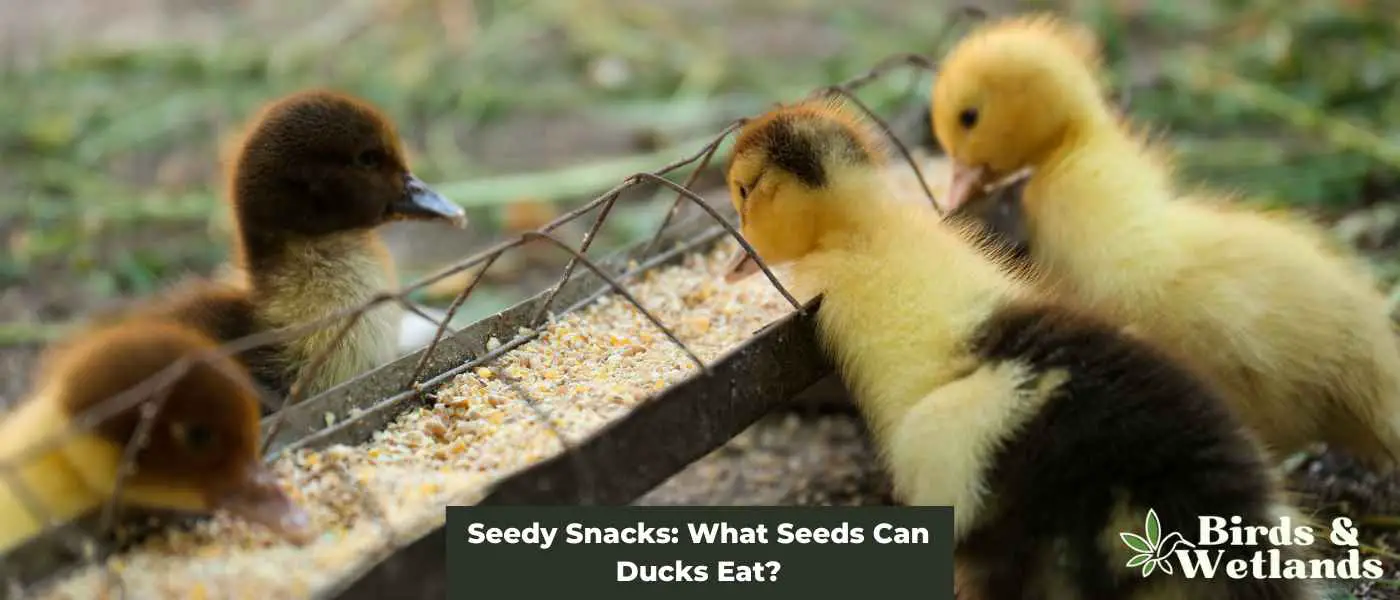A balanced and varied diet is crucial for a duck’s health, and feeding them the right seeds can provide essential nutrients that help them stay healthy and maintain a strong immune system.
So what seeds can ducks eat?
Ducks can safely consume various seeds as part of a balanced diet. Common seeds that ducks enjoy include sunflower seeds, millet, safflower seeds, and cracked corn. Seeds provide essential nutrients, vitamins, and minerals, making them a healthy snack option.
However, it is crucial to feed seeds in moderation, as they should not replace high-quality commercial duck feed, vegetables, and grains that make up the majority of a duck’s diet.
Key takeaways:
Ducks can eat many edible seeds, but some seeds should be avoided.
Safe seed options include sunflower, safflower, squash, cucumber, pomegranate, sesame, pumpkin, chia, hemp, watermelon, milo, birdseed, and rice.
Avoid stone fruit pits (e.g., cherry and peach pits) and apple seeds.
Seeds should make up no more than 10% of a duck’s diet to prevent health issues.
Overfeeding seeds can cause fatty liver disease and crop impaction in ducks.
Integrate seeds into a duck’s diet for variety and nutrition.
Provide grit and fresh water when feeding seeds to ducks.
What Seeds Can Ducks Eat?
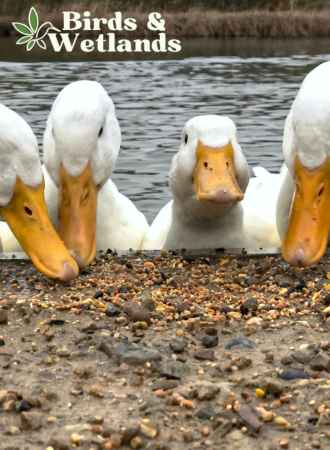
Ducks are omnivorous birds that can eat a variety of foods. Seeds are a crucial part of their diet, providing essential nutrients that help them stay healthy and maintain their immune system. In this section, we will explore the different types of seeds that ducks can eat, along with other foods that are beneficial to their health.
Edible Seeds for Ducks
Ducks can eat a wide range of seeds, including sunflower, chia, sesame, pumpkin, and birdseed. However, it is essential to ensure that the seeds are unsalted and free of any additives.
Sunflower seeds are a favorite among ducks and can be fed whole or as hulled sunflower seeds. Other seeds, such as chia and sesame seeds, can be sprinkled on top of their food as a nutritional supplement.
Table of Seeds for Ducks
| Seed Type | Can Ducks Eat? | Nutrition and Health Benefits | Portions |
|---|---|---|---|
| Sunflower | Yes, unsalted | More selenium and vitamins, boost digestive and immune systems | Mix with main feed or occasional treat |
| Pumpkin | Yes, raw | Antiparasitic, rich in minerals and carbohydrates | Add to balanced nutritional plan in limited amounts |
| Birdseed | Yes | Benefits depend on seed mix | Ensure aware of all seeds in mix |
| Chia | Yes | Nutrient-rich, good for occasional treat for ducklings | Small amounts, soak in water, give as occasional treat |
| Sesame | Yes | Fiber, calcium, good for laying ducks | Small amounts, sprouted seeds, occasional treat |
| Flax | Yes | Omega-3 fatty acids | Tiny amounts, occasional treat, supplement regular feed |
| Hemp | Yes, tiny amounts | Omega-3 fatty acids, improves egg quality | Add to grain mix or occasional treat, avoid overfeeding |
Seeds Ducks Cannot Eat
| Seeds Ducks Should Not Eat |
|---|
| Avocado |
| Cherry pits |
| Apple seeds |
| Peach pits |
| Plum pits |
| Pear seeds |
| Apricot pits |
What are the Risks of Feeding Ducks Too Many Seeds?
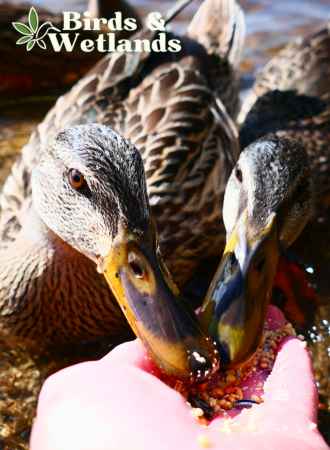
Feeding ducks too many seeds can lead to several health risks and complications. Some of the potential risks include:
Nutritional imbalances: Overfeeding seeds can result in an unbalanced diet, as seeds may lack certain essential nutrients that ducks need for optimal health. This can cause deficiencies or other health problems in the long run.
Obesity: Seeds are often high in fat and calories. Feeding ducks too many seeds can lead to weight gain and obesity, which can cause a range of health issues, including joint problems, heart disease, and reduced egg production. This can lead to problems with their legs and joins and even a fatty liver. It’s vital to keep your ducks at a healthy weight.
Choking hazards: Some seeds, especially if they are too large or not properly prepared, can pose a choking risk for ducks. It’s essential to provide seeds that are appropriate for the size and age of your ducks and to ensure they are prepared safely.
Toxicity: Some seeds can be toxic to ducks if consumed in large quantities, such as avocado pits or apple seeds. Always research the seeds you plan to offer your ducks and avoid feeding them anything potentially harmful.
Dependency: Ducks may become overly reliant on seeds as a food source, which can discourage them from foraging for more diverse and nutritionally complete food sources in their environment.
Overfeeding ducks with edible seeds can result in excessive calorie and fat intake, leading to obesity and potentially fatty liver disease, especially in laying ducks. Fatty liver disease is also induced in meat ducks to produce foie gras.
The symptoms of this disease include lethargy, diarrhea, labored breathing, large or distended abdomen, brittle eggshells, and sudden death due to internal bleeding (especially when laying).
To prevent fatty liver disease, ducks should be fed a balanced diet that includes fresh fruits, vegetables, protein, and all-purpose commercial flock feed, with seeds making up no more than 10% of their overall diet. Oil-based seeds should only be given as occasional treats or nutritional supplements to a wider feed mix, not as a staple.
A balanced and varied diet is essential for the health and well-being of ducks. By including a mix of seeds, fruits, and other nutritious foods in their diet, you can help ensure that they receive the essential nutrients they need to stay healthy and thrive.
Fruits for Ducks
Fresh fruits are another excellent food option for ducks. Bananas, berries, melon, and grapes are all safe for ducks to eat. However, it is essential to remove any pits or seeds before feeding them to ducks, as these can cause crop impaction and other health problems.
Other Foods for Ducks
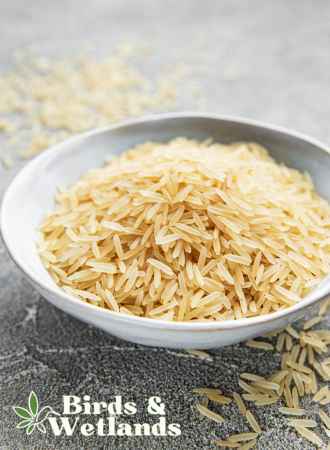
In addition to seeds and fruits, ducks can also benefit from other nutritious foods, such as uncooked rice and seed mixes. Hemp seed cakes are a popular option for duck feed, as they are high in protein and essential nutrients.

Black Larvae
High Nutritional Value: Rich in protein, calcium, and other essential nutrients.
Boosts Calcium Intake: With 50-75 times more calcium than mealworms

UCM Dried Mealworms
Nutrient-Dense: Packed with essential vitamins and minerals.
High Protein Content: With 53% protein,
FAQs
Can ducks eat sunflower seeds?
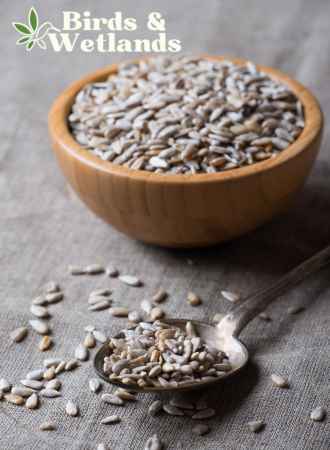
Yes, ducks eat sunflower seeds, but they should be unsalted and feeding sunflower seeds should be in moderation. Sunflower seeds are a good source of selenium and vitamins, which can help boost the ducks’ digestive and immune systems. However, it is essential not to over feed ducks sunflower seeds, as they are high in fat and calories. Feed sunflower seeds with the ducks’ main feed or offer them as an occasional treat to maintain a balanced and nutritious diet.
Black oil sunflower seeds are a type of sunflower seed with a black outer shell and feeding these Sunflower Seeds to Ducks is quite common. They are smaller and thinner than the striped sunflower seeds, which are more commonly found as a snack for humans.
Black oil sunflower seeds have a high oil content, which makes them an excellent source of energy and nutrition for various animals, including birds and ducks, so great to add to a duck’s diet.
Can Ducks Eat Salted Sunflower Seeds?
No, ducks should not be fed salted sunflower seeds. Salt can be harmful to ducks, as their bodies are not designed to process high levels of sodium. Consuming too much salt can lead to dehydration, kidney damage, and even death in ducks. Instead, provide unsalted sunflower seeds in moderation, mixed with their main feed or as an occasional treat, to maintain a balanced and nutritious diet.
Can ducks eat Bird seeds?
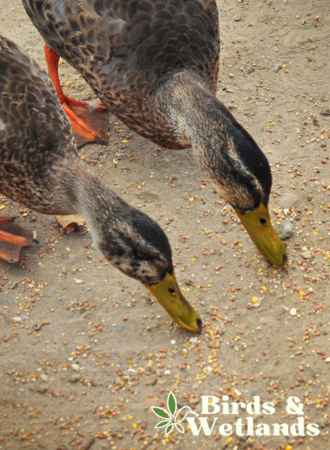
Yes, ducks can eat bird seeds, but it’s essential to ensure that the seed mix is appropriate for ducks and does not contain any harmful ingredients. Bird seed can be mixed with their main feed or provided as an occasional treat.
Can ducks eat chia seeds?
Yes, ducks can eat chia seeds. They are nutrient-rich and can be a good occasional treat for ducklings. Offer small amounts, soaked in water, to ensure proper digestion.
Can ducks eat pumpkin seeds?
Yes, ducks can eat pumpkin seeds. They are antiparasitic and rich in minerals and carbohydrates. Add them to a balanced nutritional plan in limited amounts to maintain a healthy diet for your ducks.
Can ducks eat watermelon seeds?
Yes, ducks can eat watermelon seeds. They provide an additional source of nutrients for ducks, but should be offered in moderation to maintain a balanced diet. Make sure the seeds are clean and free of any harmful substances.
Will ducks eat grass seed?
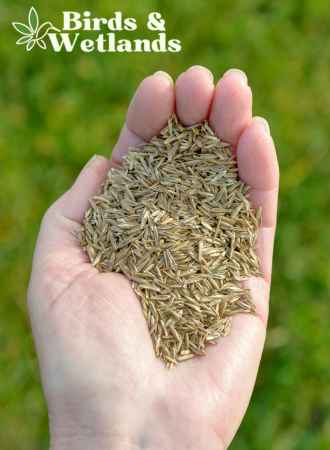
Yes, ducks may eat grass seed if they come across it. Ducks are opportunistic feeders and will consume a variety of seeds, plants, and insects.
Best Duck Feed Pellets
Are you a duck owner looking for the perfect feed to keep your feathered friends happy and healthy? Look no further than Purina Duck Feed Pellets! With their nutritionally balanced formula and high-quality ingredients, these pellets are the ultimate solution for providing your ducks with the nutrition they need to thrive.
Pros
- Complete Nutrition: Purina Duck Feed Pellets are nutritionally balanced to provide all the essential vitamins and minerals that ducks need to stay healthy and strong.
- Easy to Digest: The pellets are specially formulated to be easy to digest, which makes them ideal for ducks of all ages.
- Promotes Growth and Development: With its balanced nutrition formula, Purina Duck Feed Pellets are designed to support healthy growth and development in ducks.
- Suitable for All Breeds: Whether you have domestic ducks or wild ducks, Purina Duck Feed Pellets are suitable for all breeds of ducks.
- Trusted Quality: Purina has been producing high-quality animal feed for over 100 years, so you can trust that your ducks are getting the best possible nutrition with Purina Duck Feed Pellets.
Cons
- Cost: Compared to other types of duck feed on the market, Purina Duck Feed Pellets can be slightly more expensive. However, many customers feel that the high-quality ingredients and balanced nutrition formula are worth the extra investment.
- Pellet Size: Some customers have noted that the pellet size of Purina Duck Feed Pellets can be quite large, which may not be suitable for smaller or younger ducks. However, many customers have reported that the pellets can easily be broken up or soaked in water to make them easier to eat.

